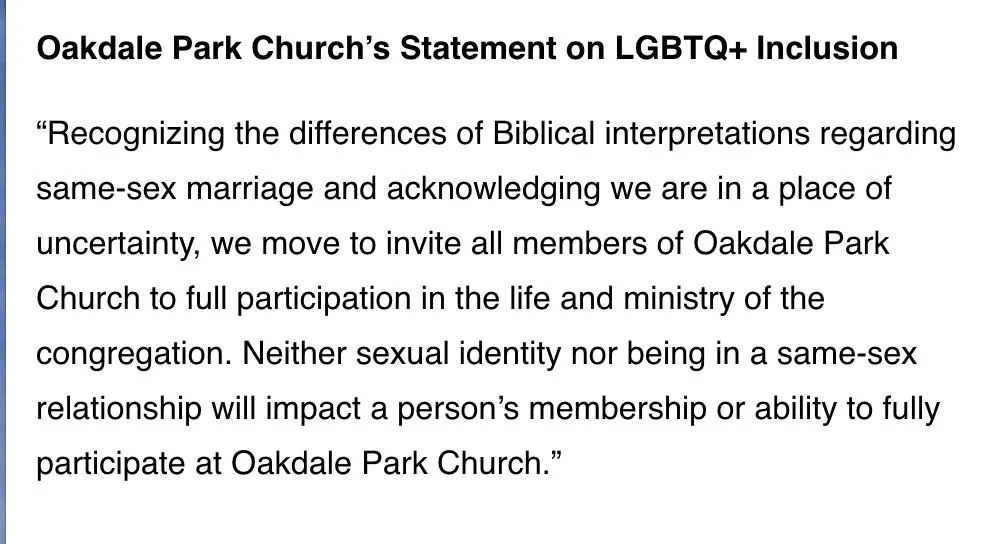Christians, Stop Playing Games with LGBTQ Ideologies
How Christians get duped into adopting the language of LGBTQ activists
What Happens When Churches Fail to Teach Biblical Sexuality
I found out recently that a church I used to go to is now a gay affirming church. After a friend tipped me off, I verified it myself from the church’s website.
This got me thinking. Biblical teaching on sexuality is an urgent need in the modern church. If biblical sexuality isn't taught regularly from the pulpit, there’s a few things you can expect to happen.
1. Church members will lack the necessary biblical categories to interpret what they see in the world.
2. They may lack confidence in their own spiritual instincts because these instincts have been insufficiently sharpened by scripture from leadership.
3. They will be less hesitant to speak out about it because they've not seen it modeled from the front
4. The silence on the issue creates a friendly environment for worldly ideas to take root and grow, like leaven which leavens the whole lump (1Cor5:6). Quietly and under the radar, a critical mass of LGBTQ sympathetic church members begins to form.
5. When a "trigger event" happens, such as a member's child coming out as LGBTQ, the issue spills out into the open, forcing the entire church to suddenly deal with something they haven't been trained on from the pulpit
6. The controversy causes anxiety to rise in the church, which hinders calm, biblical reasoning. The conservatives appeal to arguments from scripture and nature. The liberals appeal to emotional arguments and vague, subjective notions of "love" and "unity."
Emotional arguments are easy to make and have persuasive power, even though they are wrong. Biblical arguments are harder to make, require patience and disciplined thought, even though they're right.
7. Faced w this crisis, church leaders are forced to make decisions about how to move forward. For the sake of unity, they seek some kind of middle ground, and make a public statement.
This effectively cements a leftward trajectory within the church. The leaven has done its work. The culture and expectations of church members are now shaped by this statement. This encourages and emboldens LGBTQ affirming members, who see this as a sign of progress.
8. Some conservative members leave right away. Others stay and seek reform for a while, which rarely succeeds. 9. Even if they have personal reservations, church leaders under this new policy take an "adapt or die" approach, since they have bills to pay and families to feed.
I've seen this many times. In my view, some version of this story will continue to play out in every church, because the issue will not go away.
Don’t Use the Language Demanded by LGBTQ Activists
Somewhat related…
Acts 29 is a church planting network that I’ve been part of for over ten years. A few weeks ago, Acts 29 published a resource video that caused a bit of controversy online because it signaled friendliness towards LGBTQ sins while being critical of Christians and churches who love them enough to speak truth about their sin.
I recorded a response video where I addressed a few of the biggest problems with the original video.
The day after I posted this video, the original video was removed from the Acts 29 website and an apology letter is now in its place.
That’s a good sign and I’m thankful for it. But the fact that a video like this could ever be published in the first place is concerning. It shows either a lack of discernment about the rhetorical power of LGBTQ language, or perhaps a desire to signal support for them.
To be clear, Acts 29 is not a “gay affirming” network. I know many pastors in the network. They are solid, faithful leaders and are solid on biblical sexuality. My concern is that ambiguity on these matters can open a door for activists to use to pull the network in this direction.
Claiming to Adhere to “Historic Teaching on Sexuality” isn’t Enough
Some churches and Christian organizations think they can avoid dealing explicitly with these issues by claiming adherence to “historic teachings on sexuality,” or they uphold “traditional marriage as the norm,” or similar statements.
Unfortunately, these statements aren’t good enough.
Acts 29, for example, has this statement on their website:
Acts 29 has always—and will always—hold to a historically orthodox view on gender and human sexuality.
That statement sounds good initially, but it is too vague. Modern statements on sexuality have to be very thorough and specific, since any wiggle-room will be exploited to advance the LGBTQ agenda.
For example, Revoice is a “gay Christian” organization that claims to also uphold the Bible’s teaching on traditional marriage and sexuality. They say their goal is to help people who are struggling with their sexuality to follow Christ faithfully. But in reality, Revoice has done more harm than good.
Revoice's website says:
Whether individuals choose “gay” or “same-sex-attracted” to describe their orientation and experience is a matter of wisdom and liberty, and should not divide believers who otherwise share a commitment to historic Christian teaching about marriage and sexuality.
Both Acts 29 and Revoice use similar language of upholding historic Christian teaching about sexuality, but the vagueness of that statement allows LGBTQ activists and gay affirming Christians to promote a gay Christian “identity” as long as they (1) uphold traditional marriage and (2) refrain from physical sexual immorality.
Now, Acts 29 doesn’t affirm “gay Christian” as a legitimate Christian identity. But Acts 29’s language of holding to “historically orthodox views on gender and human sexuality” is not substantively different from Revoice’s affirmation of “historic Christian teaching about marriage and sexuality.”
Pro-gay Christians and LGBTQ activists certainly exploit Acts 29’s ambiguity unless they significantly clarify their position. If Acts 29 does provide a strong statement that has real teeth, it will upset some people and some churches will probably leave the network. This is inevitable.
This issue is not going away. Every Christian church, parachurch, school, or non-profit organization will have to openly and explicitly state their convictions on human sexuality, or they will eventually be captured by LGBTQ ideologies. Silence will be regarded as affirmation. If you don’t explicitly oppose it, you will be assumed to support it.
The Naive Foolishness of “Pronoun Hospitality”
I know lots of Christians who are pressured in their workplaces to state their pronouns in various places.
It seems like a simple thing to do. What’s the harm in putting “he/him” by my name in my email signature?
The harm is in allowing LGBTQ activists to dictate the terms of the English language. If a man chooses to identify as a woman and legally changes his name to a woman’s name, a Christian could reasonably accommodate that request.
But pronouns reflect the reality that God has hard-wired into the created order. There are two and only two sexual identities: male and female. It is not good, wise, loving, or God-honoring to change the way language is used in order to help someone who is sinning against God feel more normal about it.
Some Christians have argued that using someone’s “preferred pronouns” could be a loving way to practice Christian hospitality.
Nonsense. There is nothing Christian or loving about “pronoun hospitality.” This is a post-modern idea that language is fluid and malleable.
Here’s a short summary of post modern philosopher Jacques Derrida's teaching.
Using someone’s preferred pronouns may sound like the kind and loving thing to do, but ultimately it undermines the truth.
When Christians announce their own personal pronouns (she/her or he/him), they are choosing to play along with the demands of LGBTQ activists. In my view, this is a line in the sand sort of issue. Every Christian who goes along with this is allowing their personal integrity to be used to advance a harmful agenda.
God’s Good Design
I wrote the book “God’s Good Design: A Biblical, Theological and Practical Guide to Human Sexuality” to help Christians get a firm grasp on God’s design so we can live faithfully as men and women in the modern world.
The feedback from the book so far has been incredible. I’ve heard from many pastors, church leaders, and ordinary Christians about how the book has encouraged and challenged them to think more biblically about sexuality.
What of the unique features of the book is a positive, constructive vision for sexuality that gives guidance about what’s good instead an exclusive focus on what’s bad.
If you have already read the book, please help get the word out by…






If you are o.k. with what The Lord God calls an abomination, you are not of God, but the devil.